Essay on Fundamentals of Management: Decision Making and Ethics
VerifiedAdded on 2021/05/31
|10
|2402
|204
Essay
AI Summary
This essay delves into the fundamentals of management, focusing on the critical aspects of decision-making and ethical considerations. It outlines a step-by-step decision-making process, emphasizing the importance of gathering information, setting criteria, evaluating alternatives, and communicating decisions effectively. The essay stresses the significance of ethics in making sound judgments and explores various ethical theories, including consequentialism, Kantian deontologism, natural law, and virtue ethics. It discusses ethical dilemmas such as confidentiality, bias, and moral beliefs. The essay uses a scenario of an experimental vaccine to illustrate ethical challenges and the consequences of unethical decisions. It concludes by emphasizing the importance of ethical considerations in all organizational decisions and references scholarly works on the subject.
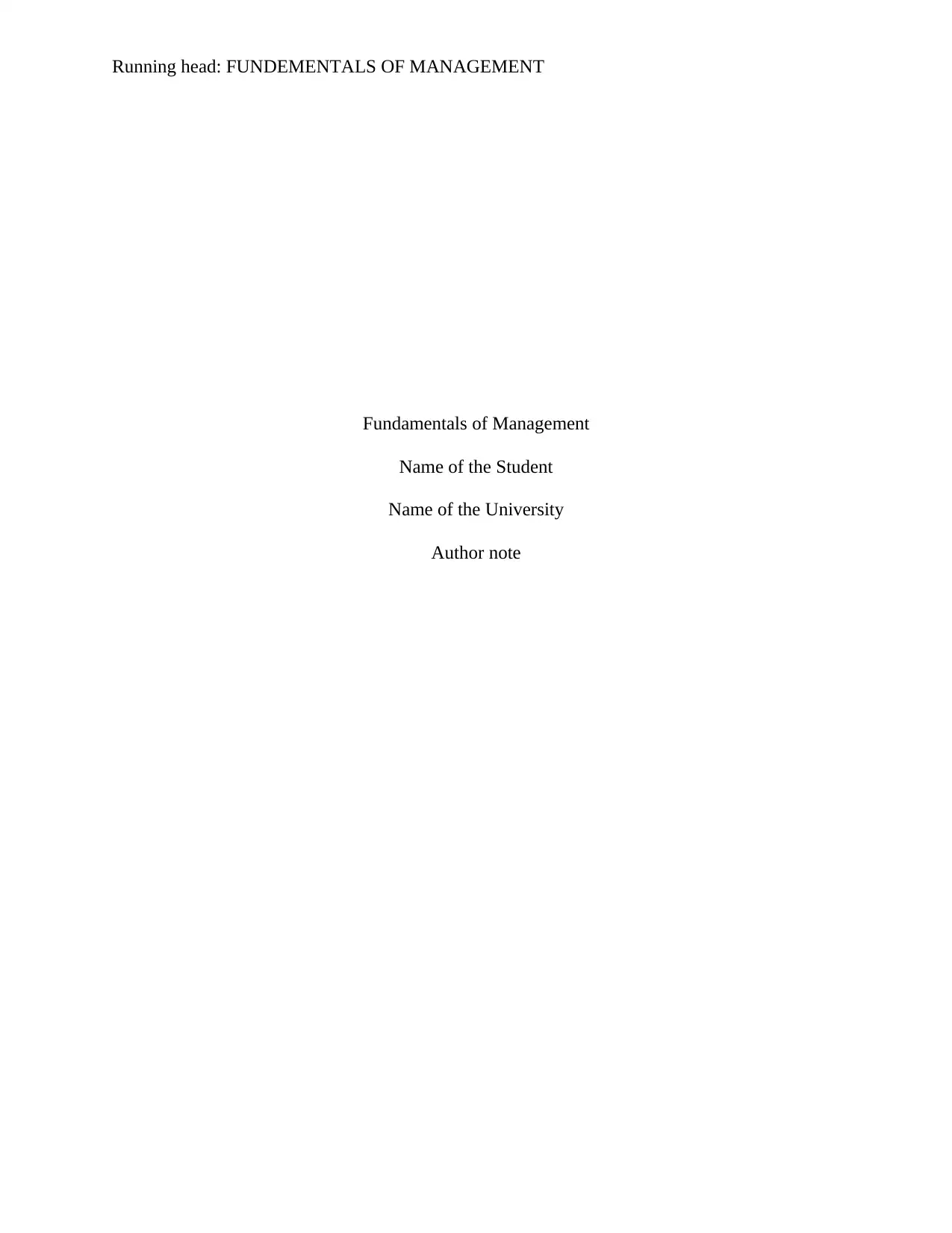
Running head: FUNDEMENTALS OF MANAGEMENT
Fundamentals of Management
Name of the Student
Name of the University
Author note
Fundamentals of Management
Name of the Student
Name of the University
Author note
Paraphrase This Document
Need a fresh take? Get an instant paraphrase of this document with our AI Paraphraser
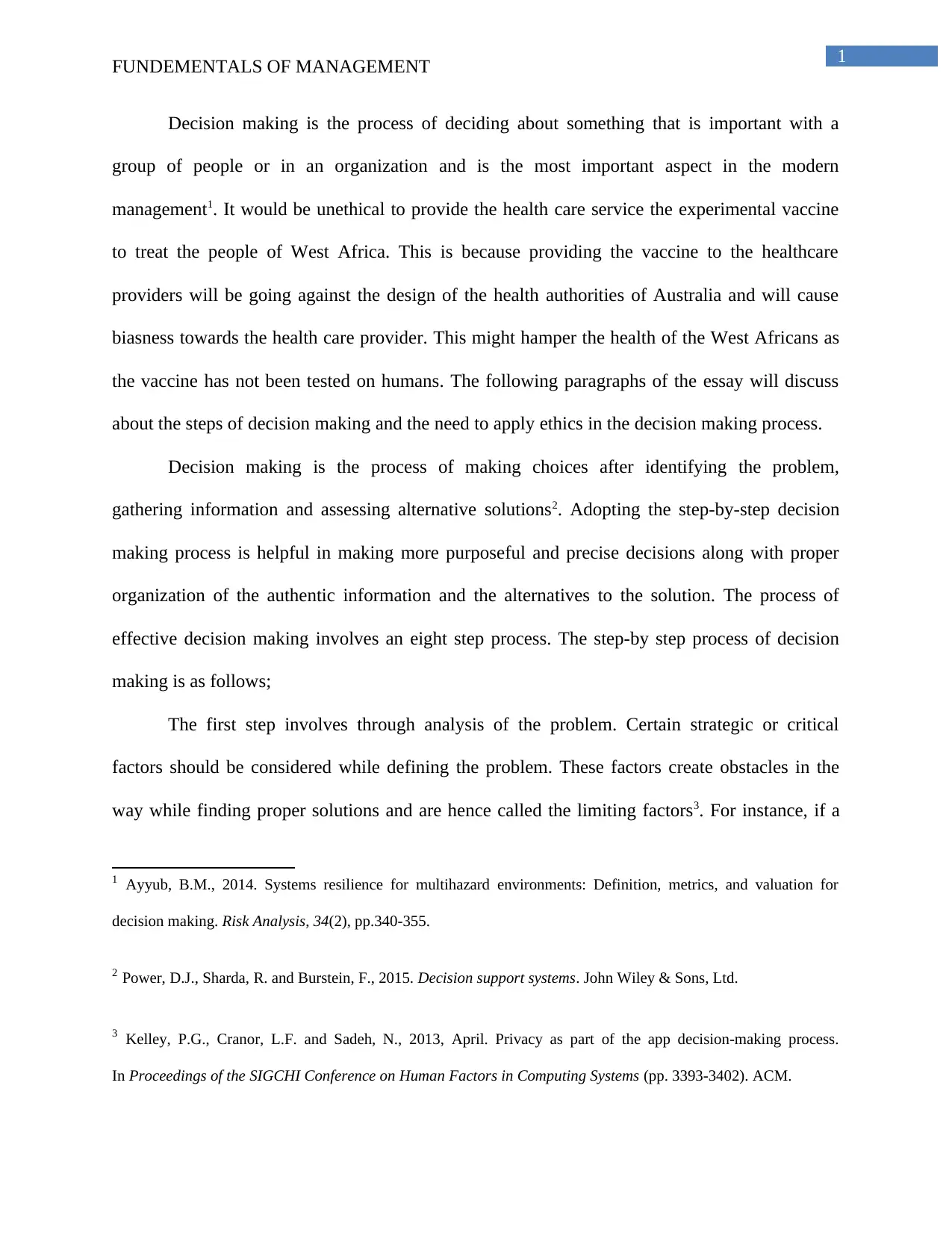
1
FUNDEMENTALS OF MANAGEMENT
Decision making is the process of deciding about something that is important with a
group of people or in an organization and is the most important aspect in the modern
management1. It would be unethical to provide the health care service the experimental vaccine
to treat the people of West Africa. This is because providing the vaccine to the healthcare
providers will be going against the design of the health authorities of Australia and will cause
biasness towards the health care provider. This might hamper the health of the West Africans as
the vaccine has not been tested on humans. The following paragraphs of the essay will discuss
about the steps of decision making and the need to apply ethics in the decision making process.
Decision making is the process of making choices after identifying the problem,
gathering information and assessing alternative solutions2. Adopting the step-by-step decision
making process is helpful in making more purposeful and precise decisions along with proper
organization of the authentic information and the alternatives to the solution. The process of
effective decision making involves an eight step process. The step-by step process of decision
making is as follows;
The first step involves through analysis of the problem. Certain strategic or critical
factors should be considered while defining the problem. These factors create obstacles in the
way while finding proper solutions and are hence called the limiting factors3. For instance, if a
1 Ayyub, B.M., 2014. Systems resilience for multihazard environments: Definition, metrics, and valuation for
decision making. Risk Analysis, 34(2), pp.340-355.
2 Power, D.J., Sharda, R. and Burstein, F., 2015. Decision support systems. John Wiley & Sons, Ltd.
3 Kelley, P.G., Cranor, L.F. and Sadeh, N., 2013, April. Privacy as part of the app decision-making process.
In Proceedings of the SIGCHI Conference on Human Factors in Computing Systems (pp. 3393-3402). ACM.
FUNDEMENTALS OF MANAGEMENT
Decision making is the process of deciding about something that is important with a
group of people or in an organization and is the most important aspect in the modern
management1. It would be unethical to provide the health care service the experimental vaccine
to treat the people of West Africa. This is because providing the vaccine to the healthcare
providers will be going against the design of the health authorities of Australia and will cause
biasness towards the health care provider. This might hamper the health of the West Africans as
the vaccine has not been tested on humans. The following paragraphs of the essay will discuss
about the steps of decision making and the need to apply ethics in the decision making process.
Decision making is the process of making choices after identifying the problem,
gathering information and assessing alternative solutions2. Adopting the step-by-step decision
making process is helpful in making more purposeful and precise decisions along with proper
organization of the authentic information and the alternatives to the solution. The process of
effective decision making involves an eight step process. The step-by step process of decision
making is as follows;
The first step involves through analysis of the problem. Certain strategic or critical
factors should be considered while defining the problem. These factors create obstacles in the
way while finding proper solutions and are hence called the limiting factors3. For instance, if a
1 Ayyub, B.M., 2014. Systems resilience for multihazard environments: Definition, metrics, and valuation for
decision making. Risk Analysis, 34(2), pp.340-355.
2 Power, D.J., Sharda, R. and Burstein, F., 2015. Decision support systems. John Wiley & Sons, Ltd.
3 Kelley, P.G., Cranor, L.F. and Sadeh, N., 2013, April. Privacy as part of the app decision-making process.
In Proceedings of the SIGCHI Conference on Human Factors in Computing Systems (pp. 3393-3402). ACM.
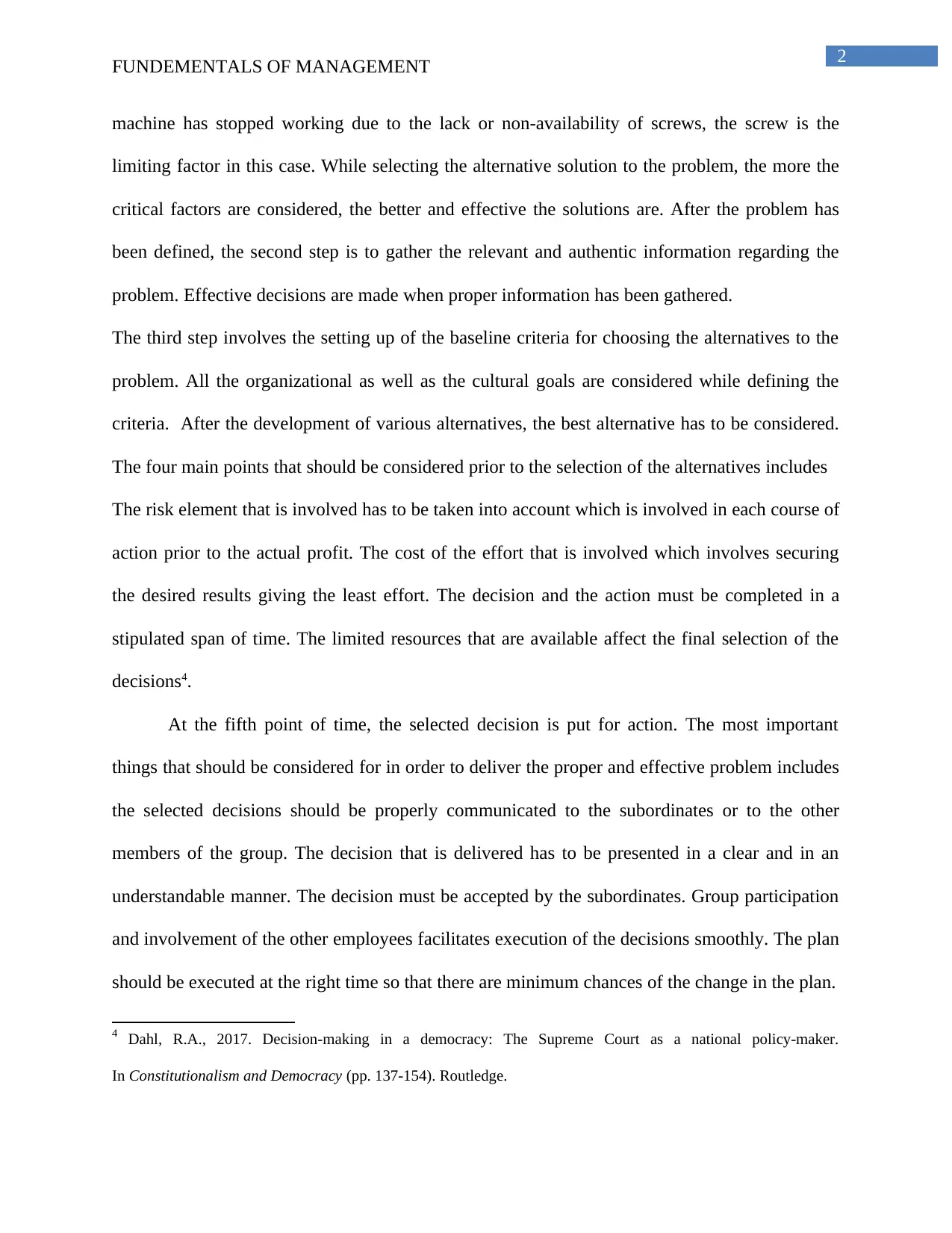
2
FUNDEMENTALS OF MANAGEMENT
machine has stopped working due to the lack or non-availability of screws, the screw is the
limiting factor in this case. While selecting the alternative solution to the problem, the more the
critical factors are considered, the better and effective the solutions are. After the problem has
been defined, the second step is to gather the relevant and authentic information regarding the
problem. Effective decisions are made when proper information has been gathered.
The third step involves the setting up of the baseline criteria for choosing the alternatives to the
problem. All the organizational as well as the cultural goals are considered while defining the
criteria. After the development of various alternatives, the best alternative has to be considered.
The four main points that should be considered prior to the selection of the alternatives includes
The risk element that is involved has to be taken into account which is involved in each course of
action prior to the actual profit. The cost of the effort that is involved which involves securing
the desired results giving the least effort. The decision and the action must be completed in a
stipulated span of time. The limited resources that are available affect the final selection of the
decisions4.
At the fifth point of time, the selected decision is put for action. The most important
things that should be considered for in order to deliver the proper and effective problem includes
the selected decisions should be properly communicated to the subordinates or to the other
members of the group. The decision that is delivered has to be presented in a clear and in an
understandable manner. The decision must be accepted by the subordinates. Group participation
and involvement of the other employees facilitates execution of the decisions smoothly. The plan
should be executed at the right time so that there are minimum chances of the change in the plan.
4 Dahl, R.A., 2017. Decision-making in a democracy: The Supreme Court as a national policy-maker.
In Constitutionalism and Democracy (pp. 137-154). Routledge.
FUNDEMENTALS OF MANAGEMENT
machine has stopped working due to the lack or non-availability of screws, the screw is the
limiting factor in this case. While selecting the alternative solution to the problem, the more the
critical factors are considered, the better and effective the solutions are. After the problem has
been defined, the second step is to gather the relevant and authentic information regarding the
problem. Effective decisions are made when proper information has been gathered.
The third step involves the setting up of the baseline criteria for choosing the alternatives to the
problem. All the organizational as well as the cultural goals are considered while defining the
criteria. After the development of various alternatives, the best alternative has to be considered.
The four main points that should be considered prior to the selection of the alternatives includes
The risk element that is involved has to be taken into account which is involved in each course of
action prior to the actual profit. The cost of the effort that is involved which involves securing
the desired results giving the least effort. The decision and the action must be completed in a
stipulated span of time. The limited resources that are available affect the final selection of the
decisions4.
At the fifth point of time, the selected decision is put for action. The most important
things that should be considered for in order to deliver the proper and effective problem includes
the selected decisions should be properly communicated to the subordinates or to the other
members of the group. The decision that is delivered has to be presented in a clear and in an
understandable manner. The decision must be accepted by the subordinates. Group participation
and involvement of the other employees facilitates execution of the decisions smoothly. The plan
should be executed at the right time so that there are minimum chances of the change in the plan.
4 Dahl, R.A., 2017. Decision-making in a democracy: The Supreme Court as a national policy-maker.
In Constitutionalism and Democracy (pp. 137-154). Routledge.
⊘ This is a preview!⊘
Do you want full access?
Subscribe today to unlock all pages.

Trusted by 1+ million students worldwide
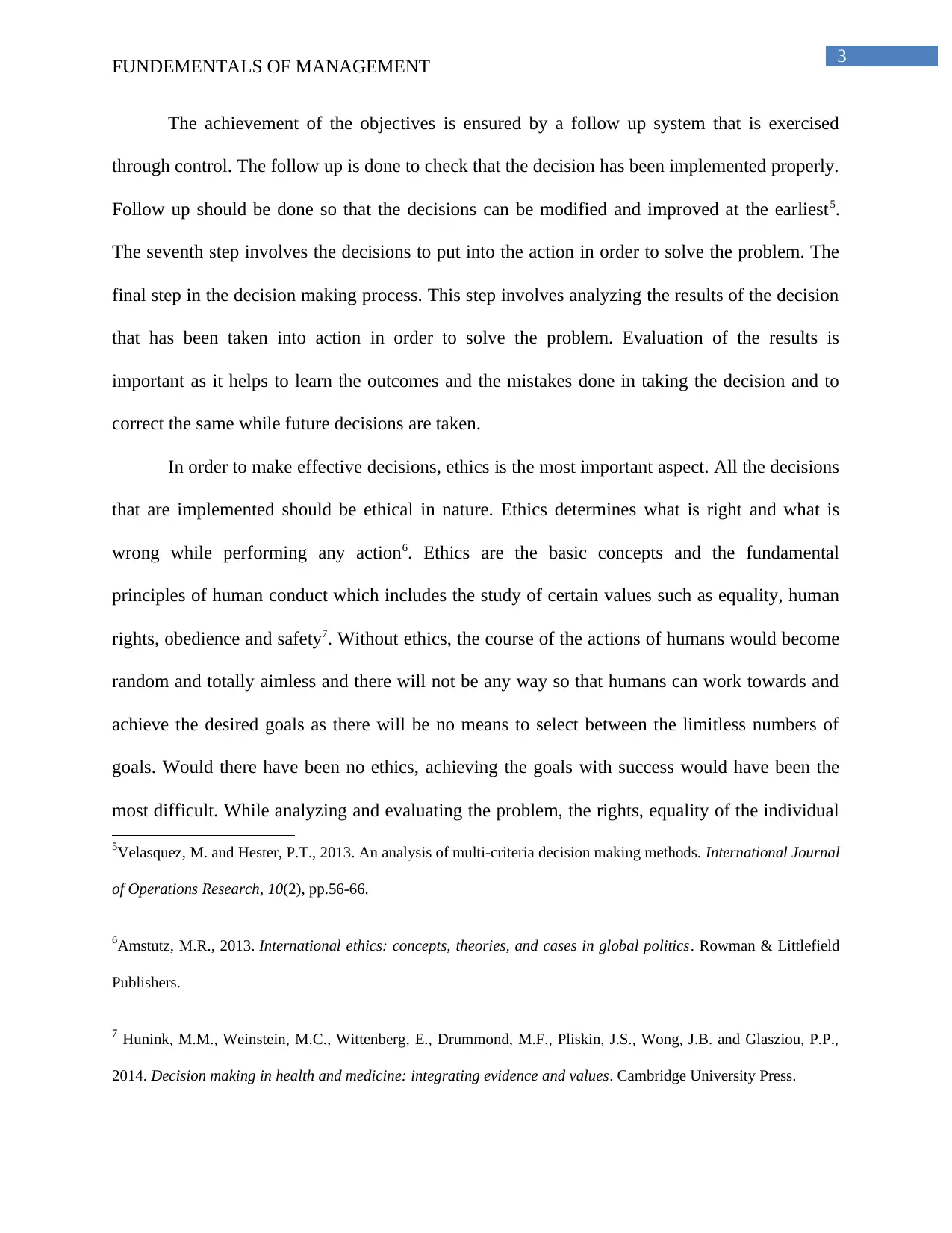
3
FUNDEMENTALS OF MANAGEMENT
The achievement of the objectives is ensured by a follow up system that is exercised
through control. The follow up is done to check that the decision has been implemented properly.
Follow up should be done so that the decisions can be modified and improved at the earliest5.
The seventh step involves the decisions to put into the action in order to solve the problem. The
final step in the decision making process. This step involves analyzing the results of the decision
that has been taken into action in order to solve the problem. Evaluation of the results is
important as it helps to learn the outcomes and the mistakes done in taking the decision and to
correct the same while future decisions are taken.
In order to make effective decisions, ethics is the most important aspect. All the decisions
that are implemented should be ethical in nature. Ethics determines what is right and what is
wrong while performing any action6. Ethics are the basic concepts and the fundamental
principles of human conduct which includes the study of certain values such as equality, human
rights, obedience and safety7. Without ethics, the course of the actions of humans would become
random and totally aimless and there will not be any way so that humans can work towards and
achieve the desired goals as there will be no means to select between the limitless numbers of
goals. Would there have been no ethics, achieving the goals with success would have been the
most difficult. While analyzing and evaluating the problem, the rights, equality of the individual
5Velasquez, M. and Hester, P.T., 2013. An analysis of multi-criteria decision making methods. International Journal
of Operations Research, 10(2), pp.56-66.
6Amstutz, M.R., 2013. International ethics: concepts, theories, and cases in global politics. Rowman & Littlefield
Publishers.
7 Hunink, M.M., Weinstein, M.C., Wittenberg, E., Drummond, M.F., Pliskin, J.S., Wong, J.B. and Glasziou, P.P.,
2014. Decision making in health and medicine: integrating evidence and values. Cambridge University Press.
FUNDEMENTALS OF MANAGEMENT
The achievement of the objectives is ensured by a follow up system that is exercised
through control. The follow up is done to check that the decision has been implemented properly.
Follow up should be done so that the decisions can be modified and improved at the earliest5.
The seventh step involves the decisions to put into the action in order to solve the problem. The
final step in the decision making process. This step involves analyzing the results of the decision
that has been taken into action in order to solve the problem. Evaluation of the results is
important as it helps to learn the outcomes and the mistakes done in taking the decision and to
correct the same while future decisions are taken.
In order to make effective decisions, ethics is the most important aspect. All the decisions
that are implemented should be ethical in nature. Ethics determines what is right and what is
wrong while performing any action6. Ethics are the basic concepts and the fundamental
principles of human conduct which includes the study of certain values such as equality, human
rights, obedience and safety7. Without ethics, the course of the actions of humans would become
random and totally aimless and there will not be any way so that humans can work towards and
achieve the desired goals as there will be no means to select between the limitless numbers of
goals. Would there have been no ethics, achieving the goals with success would have been the
most difficult. While analyzing and evaluating the problem, the rights, equality of the individual
5Velasquez, M. and Hester, P.T., 2013. An analysis of multi-criteria decision making methods. International Journal
of Operations Research, 10(2), pp.56-66.
6Amstutz, M.R., 2013. International ethics: concepts, theories, and cases in global politics. Rowman & Littlefield
Publishers.
7 Hunink, M.M., Weinstein, M.C., Wittenberg, E., Drummond, M.F., Pliskin, J.S., Wong, J.B. and Glasziou, P.P.,
2014. Decision making in health and medicine: integrating evidence and values. Cambridge University Press.
Paraphrase This Document
Need a fresh take? Get an instant paraphrase of this document with our AI Paraphraser
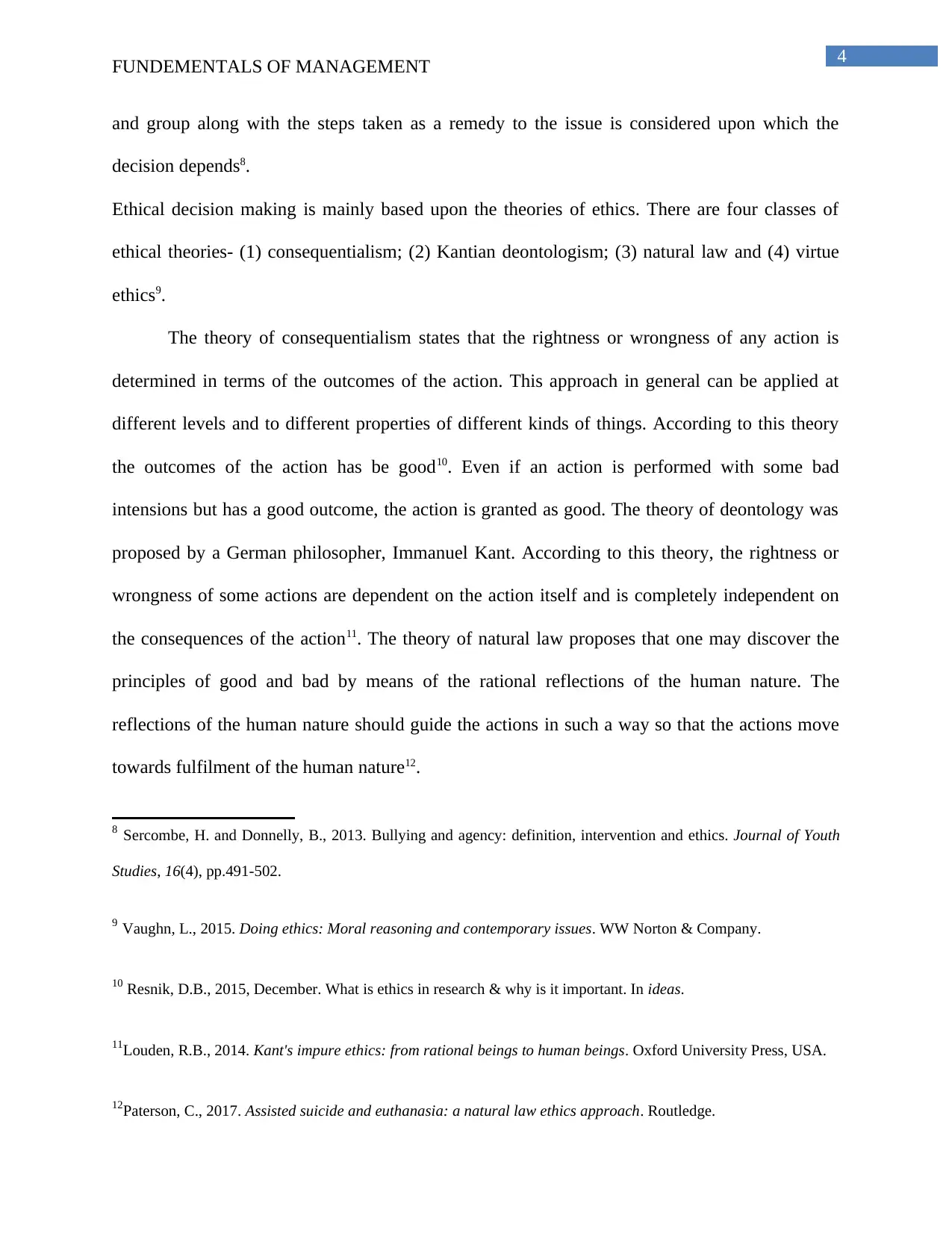
4
FUNDEMENTALS OF MANAGEMENT
and group along with the steps taken as a remedy to the issue is considered upon which the
decision depends8.
Ethical decision making is mainly based upon the theories of ethics. There are four classes of
ethical theories- (1) consequentialism; (2) Kantian deontologism; (3) natural law and (4) virtue
ethics9.
The theory of consequentialism states that the rightness or wrongness of any action is
determined in terms of the outcomes of the action. This approach in general can be applied at
different levels and to different properties of different kinds of things. According to this theory
the outcomes of the action has be good10. Even if an action is performed with some bad
intensions but has a good outcome, the action is granted as good. The theory of deontology was
proposed by a German philosopher, Immanuel Kant. According to this theory, the rightness or
wrongness of some actions are dependent on the action itself and is completely independent on
the consequences of the action11. The theory of natural law proposes that one may discover the
principles of good and bad by means of the rational reflections of the human nature. The
reflections of the human nature should guide the actions in such a way so that the actions move
towards fulfilment of the human nature12.
8 Sercombe, H. and Donnelly, B., 2013. Bullying and agency: definition, intervention and ethics. Journal of Youth
Studies, 16(4), pp.491-502.
9 Vaughn, L., 2015. Doing ethics: Moral reasoning and contemporary issues. WW Norton & Company.
10 Resnik, D.B., 2015, December. What is ethics in research & why is it important. In ideas.
11Louden, R.B., 2014. Kant's impure ethics: from rational beings to human beings. Oxford University Press, USA.
12Paterson, C., 2017. Assisted suicide and euthanasia: a natural law ethics approach. Routledge.
FUNDEMENTALS OF MANAGEMENT
and group along with the steps taken as a remedy to the issue is considered upon which the
decision depends8.
Ethical decision making is mainly based upon the theories of ethics. There are four classes of
ethical theories- (1) consequentialism; (2) Kantian deontologism; (3) natural law and (4) virtue
ethics9.
The theory of consequentialism states that the rightness or wrongness of any action is
determined in terms of the outcomes of the action. This approach in general can be applied at
different levels and to different properties of different kinds of things. According to this theory
the outcomes of the action has be good10. Even if an action is performed with some bad
intensions but has a good outcome, the action is granted as good. The theory of deontology was
proposed by a German philosopher, Immanuel Kant. According to this theory, the rightness or
wrongness of some actions are dependent on the action itself and is completely independent on
the consequences of the action11. The theory of natural law proposes that one may discover the
principles of good and bad by means of the rational reflections of the human nature. The
reflections of the human nature should guide the actions in such a way so that the actions move
towards fulfilment of the human nature12.
8 Sercombe, H. and Donnelly, B., 2013. Bullying and agency: definition, intervention and ethics. Journal of Youth
Studies, 16(4), pp.491-502.
9 Vaughn, L., 2015. Doing ethics: Moral reasoning and contemporary issues. WW Norton & Company.
10 Resnik, D.B., 2015, December. What is ethics in research & why is it important. In ideas.
11Louden, R.B., 2014. Kant's impure ethics: from rational beings to human beings. Oxford University Press, USA.
12Paterson, C., 2017. Assisted suicide and euthanasia: a natural law ethics approach. Routledge.
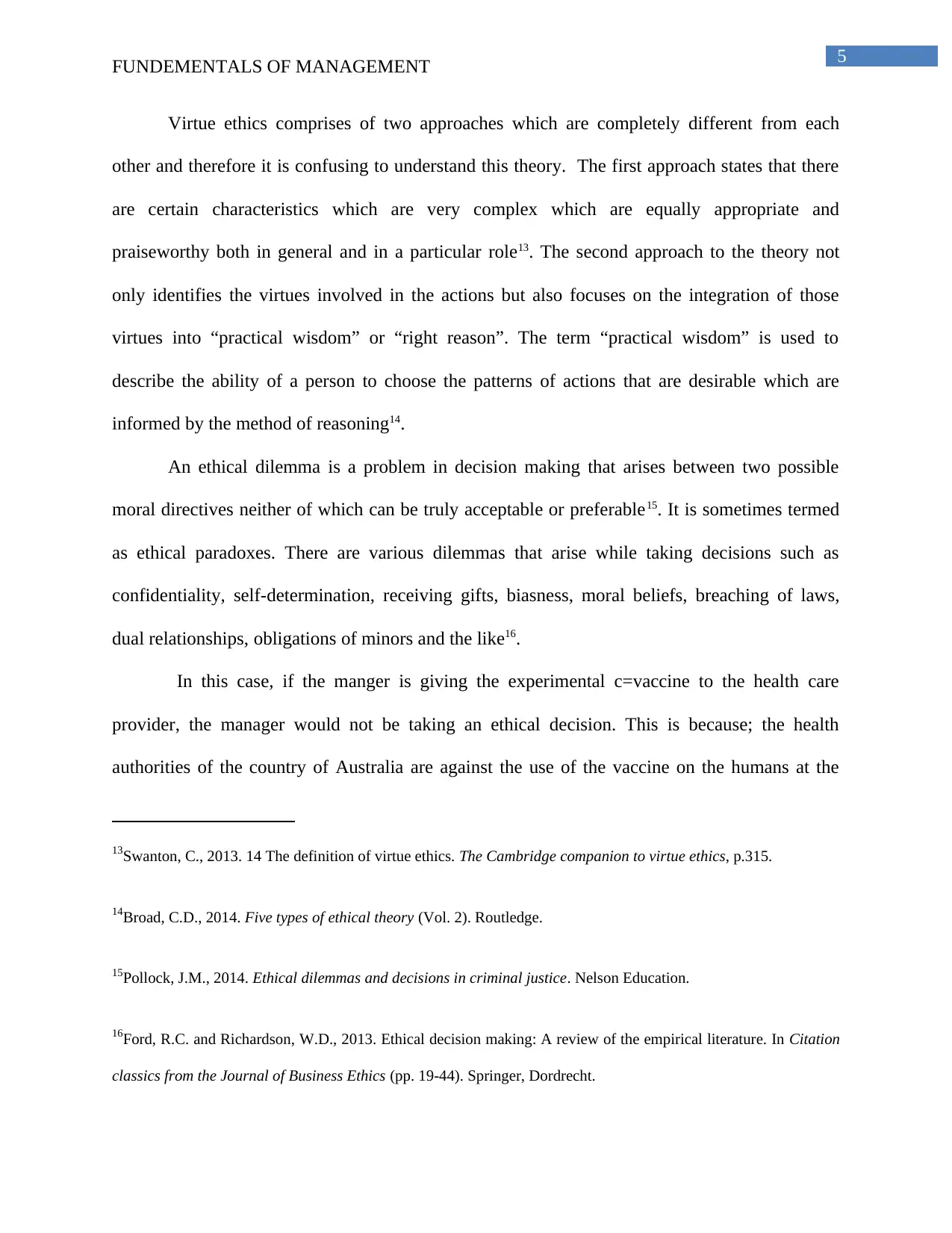
5
FUNDEMENTALS OF MANAGEMENT
Virtue ethics comprises of two approaches which are completely different from each
other and therefore it is confusing to understand this theory. The first approach states that there
are certain characteristics which are very complex which are equally appropriate and
praiseworthy both in general and in a particular role13. The second approach to the theory not
only identifies the virtues involved in the actions but also focuses on the integration of those
virtues into “practical wisdom” or “right reason”. The term “practical wisdom” is used to
describe the ability of a person to choose the patterns of actions that are desirable which are
informed by the method of reasoning14.
An ethical dilemma is a problem in decision making that arises between two possible
moral directives neither of which can be truly acceptable or preferable15. It is sometimes termed
as ethical paradoxes. There are various dilemmas that arise while taking decisions such as
confidentiality, self-determination, receiving gifts, biasness, moral beliefs, breaching of laws,
dual relationships, obligations of minors and the like16.
In this case, if the manger is giving the experimental c=vaccine to the health care
provider, the manager would not be taking an ethical decision. This is because; the health
authorities of the country of Australia are against the use of the vaccine on the humans at the
13Swanton, C., 2013. 14 The definition of virtue ethics. The Cambridge companion to virtue ethics, p.315.
14Broad, C.D., 2014. Five types of ethical theory (Vol. 2). Routledge.
15Pollock, J.M., 2014. Ethical dilemmas and decisions in criminal justice. Nelson Education.
16Ford, R.C. and Richardson, W.D., 2013. Ethical decision making: A review of the empirical literature. In Citation
classics from the Journal of Business Ethics (pp. 19-44). Springer, Dordrecht.
FUNDEMENTALS OF MANAGEMENT
Virtue ethics comprises of two approaches which are completely different from each
other and therefore it is confusing to understand this theory. The first approach states that there
are certain characteristics which are very complex which are equally appropriate and
praiseworthy both in general and in a particular role13. The second approach to the theory not
only identifies the virtues involved in the actions but also focuses on the integration of those
virtues into “practical wisdom” or “right reason”. The term “practical wisdom” is used to
describe the ability of a person to choose the patterns of actions that are desirable which are
informed by the method of reasoning14.
An ethical dilemma is a problem in decision making that arises between two possible
moral directives neither of which can be truly acceptable or preferable15. It is sometimes termed
as ethical paradoxes. There are various dilemmas that arise while taking decisions such as
confidentiality, self-determination, receiving gifts, biasness, moral beliefs, breaching of laws,
dual relationships, obligations of minors and the like16.
In this case, if the manger is giving the experimental c=vaccine to the health care
provider, the manager would not be taking an ethical decision. This is because; the health
authorities of the country of Australia are against the use of the vaccine on the humans at the
13Swanton, C., 2013. 14 The definition of virtue ethics. The Cambridge companion to virtue ethics, p.315.
14Broad, C.D., 2014. Five types of ethical theory (Vol. 2). Routledge.
15Pollock, J.M., 2014. Ethical dilemmas and decisions in criminal justice. Nelson Education.
16Ford, R.C. and Richardson, W.D., 2013. Ethical decision making: A review of the empirical literature. In Citation
classics from the Journal of Business Ethics (pp. 19-44). Springer, Dordrecht.
⊘ This is a preview!⊘
Do you want full access?
Subscribe today to unlock all pages.

Trusted by 1+ million students worldwide
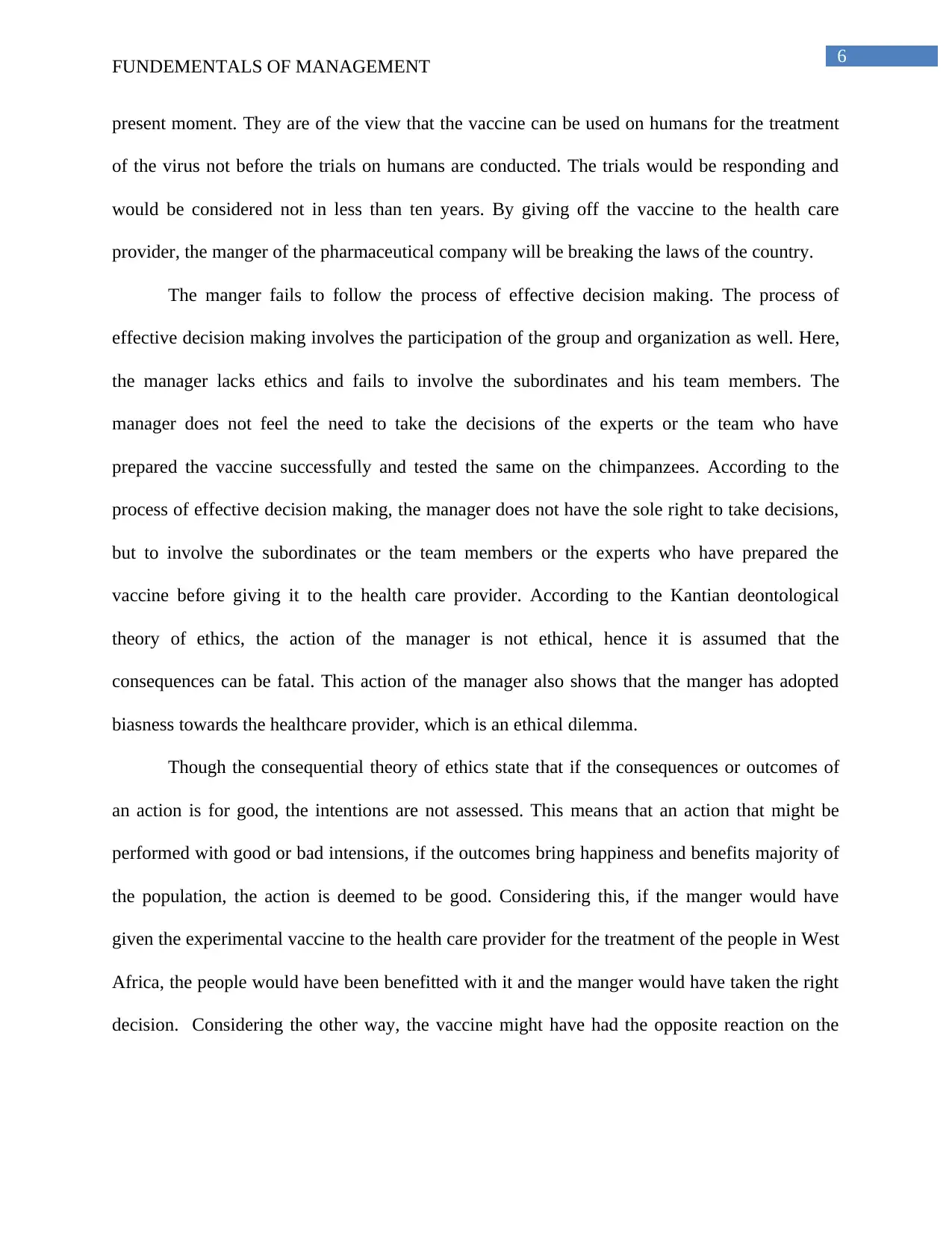
6
FUNDEMENTALS OF MANAGEMENT
present moment. They are of the view that the vaccine can be used on humans for the treatment
of the virus not before the trials on humans are conducted. The trials would be responding and
would be considered not in less than ten years. By giving off the vaccine to the health care
provider, the manger of the pharmaceutical company will be breaking the laws of the country.
The manger fails to follow the process of effective decision making. The process of
effective decision making involves the participation of the group and organization as well. Here,
the manager lacks ethics and fails to involve the subordinates and his team members. The
manager does not feel the need to take the decisions of the experts or the team who have
prepared the vaccine successfully and tested the same on the chimpanzees. According to the
process of effective decision making, the manager does not have the sole right to take decisions,
but to involve the subordinates or the team members or the experts who have prepared the
vaccine before giving it to the health care provider. According to the Kantian deontological
theory of ethics, the action of the manager is not ethical, hence it is assumed that the
consequences can be fatal. This action of the manager also shows that the manger has adopted
biasness towards the healthcare provider, which is an ethical dilemma.
Though the consequential theory of ethics state that if the consequences or outcomes of
an action is for good, the intentions are not assessed. This means that an action that might be
performed with good or bad intensions, if the outcomes bring happiness and benefits majority of
the population, the action is deemed to be good. Considering this, if the manger would have
given the experimental vaccine to the health care provider for the treatment of the people in West
Africa, the people would have been benefitted with it and the manger would have taken the right
decision. Considering the other way, the vaccine might have had the opposite reaction on the
FUNDEMENTALS OF MANAGEMENT
present moment. They are of the view that the vaccine can be used on humans for the treatment
of the virus not before the trials on humans are conducted. The trials would be responding and
would be considered not in less than ten years. By giving off the vaccine to the health care
provider, the manger of the pharmaceutical company will be breaking the laws of the country.
The manger fails to follow the process of effective decision making. The process of
effective decision making involves the participation of the group and organization as well. Here,
the manager lacks ethics and fails to involve the subordinates and his team members. The
manager does not feel the need to take the decisions of the experts or the team who have
prepared the vaccine successfully and tested the same on the chimpanzees. According to the
process of effective decision making, the manager does not have the sole right to take decisions,
but to involve the subordinates or the team members or the experts who have prepared the
vaccine before giving it to the health care provider. According to the Kantian deontological
theory of ethics, the action of the manager is not ethical, hence it is assumed that the
consequences can be fatal. This action of the manager also shows that the manger has adopted
biasness towards the healthcare provider, which is an ethical dilemma.
Though the consequential theory of ethics state that if the consequences or outcomes of
an action is for good, the intentions are not assessed. This means that an action that might be
performed with good or bad intensions, if the outcomes bring happiness and benefits majority of
the population, the action is deemed to be good. Considering this, if the manger would have
given the experimental vaccine to the health care provider for the treatment of the people in West
Africa, the people would have been benefitted with it and the manger would have taken the right
decision. Considering the other way, the vaccine might have had the opposite reaction on the
Paraphrase This Document
Need a fresh take? Get an instant paraphrase of this document with our AI Paraphraser
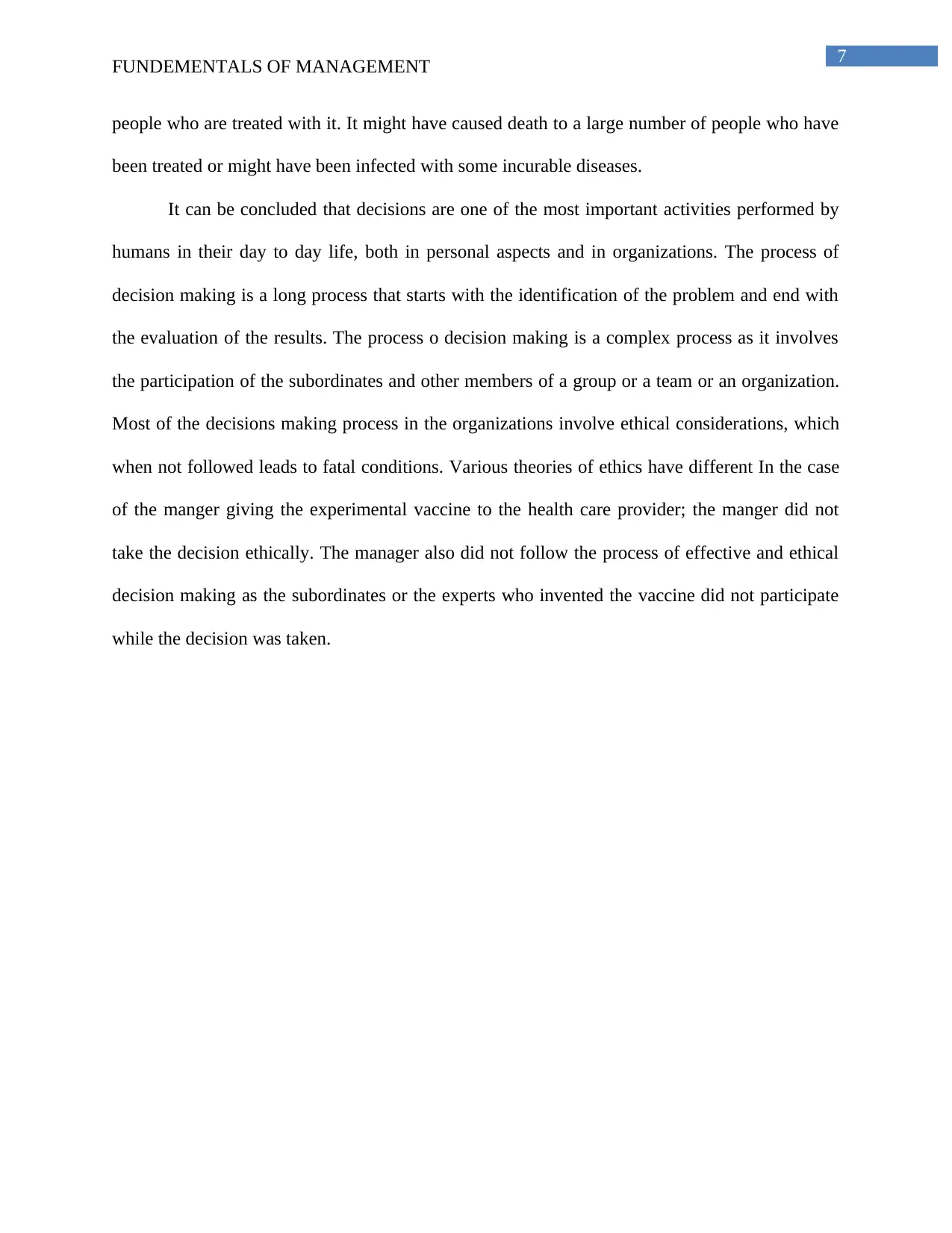
7
FUNDEMENTALS OF MANAGEMENT
people who are treated with it. It might have caused death to a large number of people who have
been treated or might have been infected with some incurable diseases.
It can be concluded that decisions are one of the most important activities performed by
humans in their day to day life, both in personal aspects and in organizations. The process of
decision making is a long process that starts with the identification of the problem and end with
the evaluation of the results. The process o decision making is a complex process as it involves
the participation of the subordinates and other members of a group or a team or an organization.
Most of the decisions making process in the organizations involve ethical considerations, which
when not followed leads to fatal conditions. Various theories of ethics have different In the case
of the manger giving the experimental vaccine to the health care provider; the manger did not
take the decision ethically. The manager also did not follow the process of effective and ethical
decision making as the subordinates or the experts who invented the vaccine did not participate
while the decision was taken.
FUNDEMENTALS OF MANAGEMENT
people who are treated with it. It might have caused death to a large number of people who have
been treated or might have been infected with some incurable diseases.
It can be concluded that decisions are one of the most important activities performed by
humans in their day to day life, both in personal aspects and in organizations. The process of
decision making is a long process that starts with the identification of the problem and end with
the evaluation of the results. The process o decision making is a complex process as it involves
the participation of the subordinates and other members of a group or a team or an organization.
Most of the decisions making process in the organizations involve ethical considerations, which
when not followed leads to fatal conditions. Various theories of ethics have different In the case
of the manger giving the experimental vaccine to the health care provider; the manger did not
take the decision ethically. The manager also did not follow the process of effective and ethical
decision making as the subordinates or the experts who invented the vaccine did not participate
while the decision was taken.
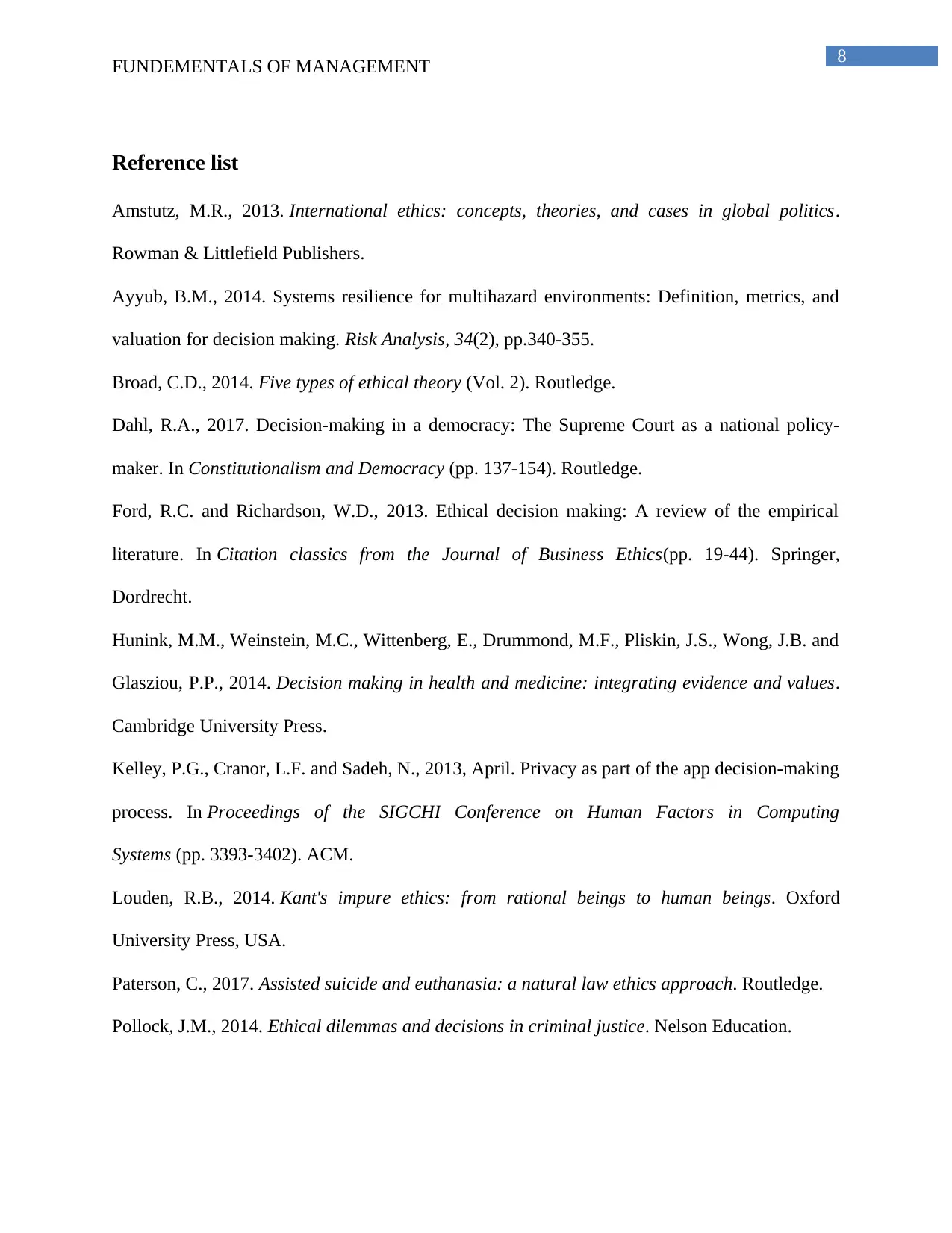
8
FUNDEMENTALS OF MANAGEMENT
Reference list
Amstutz, M.R., 2013. International ethics: concepts, theories, and cases in global politics.
Rowman & Littlefield Publishers.
Ayyub, B.M., 2014. Systems resilience for multihazard environments: Definition, metrics, and
valuation for decision making. Risk Analysis, 34(2), pp.340-355.
Broad, C.D., 2014. Five types of ethical theory (Vol. 2). Routledge.
Dahl, R.A., 2017. Decision-making in a democracy: The Supreme Court as a national policy-
maker. In Constitutionalism and Democracy (pp. 137-154). Routledge.
Ford, R.C. and Richardson, W.D., 2013. Ethical decision making: A review of the empirical
literature. In Citation classics from the Journal of Business Ethics(pp. 19-44). Springer,
Dordrecht.
Hunink, M.M., Weinstein, M.C., Wittenberg, E., Drummond, M.F., Pliskin, J.S., Wong, J.B. and
Glasziou, P.P., 2014. Decision making in health and medicine: integrating evidence and values.
Cambridge University Press.
Kelley, P.G., Cranor, L.F. and Sadeh, N., 2013, April. Privacy as part of the app decision-making
process. In Proceedings of the SIGCHI Conference on Human Factors in Computing
Systems (pp. 3393-3402). ACM.
Louden, R.B., 2014. Kant's impure ethics: from rational beings to human beings. Oxford
University Press, USA.
Paterson, C., 2017. Assisted suicide and euthanasia: a natural law ethics approach. Routledge.
Pollock, J.M., 2014. Ethical dilemmas and decisions in criminal justice. Nelson Education.
FUNDEMENTALS OF MANAGEMENT
Reference list
Amstutz, M.R., 2013. International ethics: concepts, theories, and cases in global politics.
Rowman & Littlefield Publishers.
Ayyub, B.M., 2014. Systems resilience for multihazard environments: Definition, metrics, and
valuation for decision making. Risk Analysis, 34(2), pp.340-355.
Broad, C.D., 2014. Five types of ethical theory (Vol. 2). Routledge.
Dahl, R.A., 2017. Decision-making in a democracy: The Supreme Court as a national policy-
maker. In Constitutionalism and Democracy (pp. 137-154). Routledge.
Ford, R.C. and Richardson, W.D., 2013. Ethical decision making: A review of the empirical
literature. In Citation classics from the Journal of Business Ethics(pp. 19-44). Springer,
Dordrecht.
Hunink, M.M., Weinstein, M.C., Wittenberg, E., Drummond, M.F., Pliskin, J.S., Wong, J.B. and
Glasziou, P.P., 2014. Decision making in health and medicine: integrating evidence and values.
Cambridge University Press.
Kelley, P.G., Cranor, L.F. and Sadeh, N., 2013, April. Privacy as part of the app decision-making
process. In Proceedings of the SIGCHI Conference on Human Factors in Computing
Systems (pp. 3393-3402). ACM.
Louden, R.B., 2014. Kant's impure ethics: from rational beings to human beings. Oxford
University Press, USA.
Paterson, C., 2017. Assisted suicide and euthanasia: a natural law ethics approach. Routledge.
Pollock, J.M., 2014. Ethical dilemmas and decisions in criminal justice. Nelson Education.
⊘ This is a preview!⊘
Do you want full access?
Subscribe today to unlock all pages.

Trusted by 1+ million students worldwide
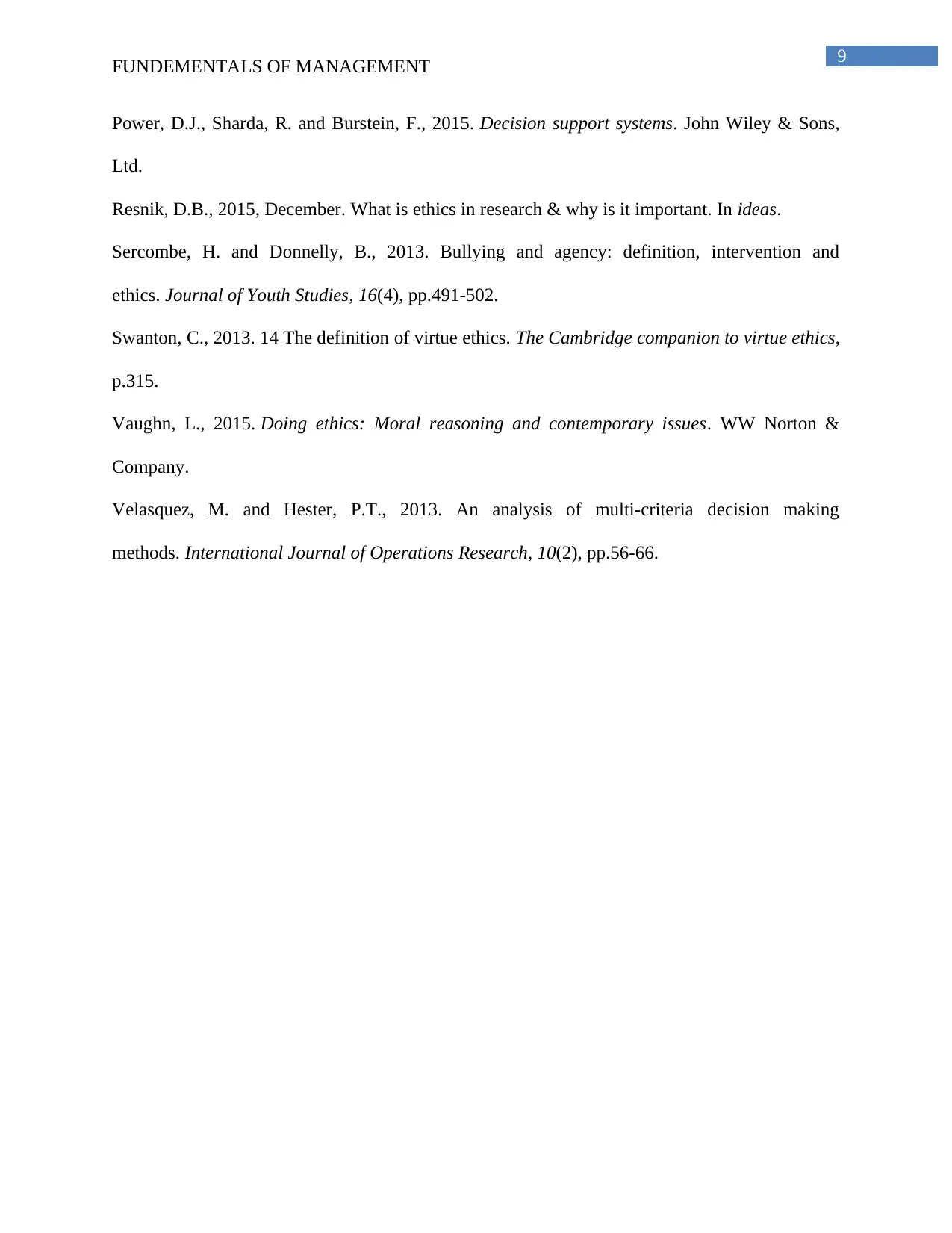
9
FUNDEMENTALS OF MANAGEMENT
Power, D.J., Sharda, R. and Burstein, F., 2015. Decision support systems. John Wiley & Sons,
Ltd.
Resnik, D.B., 2015, December. What is ethics in research & why is it important. In ideas.
Sercombe, H. and Donnelly, B., 2013. Bullying and agency: definition, intervention and
ethics. Journal of Youth Studies, 16(4), pp.491-502.
Swanton, C., 2013. 14 The definition of virtue ethics. The Cambridge companion to virtue ethics,
p.315.
Vaughn, L., 2015. Doing ethics: Moral reasoning and contemporary issues. WW Norton &
Company.
Velasquez, M. and Hester, P.T., 2013. An analysis of multi-criteria decision making
methods. International Journal of Operations Research, 10(2), pp.56-66.
FUNDEMENTALS OF MANAGEMENT
Power, D.J., Sharda, R. and Burstein, F., 2015. Decision support systems. John Wiley & Sons,
Ltd.
Resnik, D.B., 2015, December. What is ethics in research & why is it important. In ideas.
Sercombe, H. and Donnelly, B., 2013. Bullying and agency: definition, intervention and
ethics. Journal of Youth Studies, 16(4), pp.491-502.
Swanton, C., 2013. 14 The definition of virtue ethics. The Cambridge companion to virtue ethics,
p.315.
Vaughn, L., 2015. Doing ethics: Moral reasoning and contemporary issues. WW Norton &
Company.
Velasquez, M. and Hester, P.T., 2013. An analysis of multi-criteria decision making
methods. International Journal of Operations Research, 10(2), pp.56-66.
1 out of 10
Related Documents
Your All-in-One AI-Powered Toolkit for Academic Success.
+13062052269
info@desklib.com
Available 24*7 on WhatsApp / Email
![[object Object]](/_next/static/media/star-bottom.7253800d.svg)
Unlock your academic potential
Copyright © 2020–2026 A2Z Services. All Rights Reserved. Developed and managed by ZUCOL.





